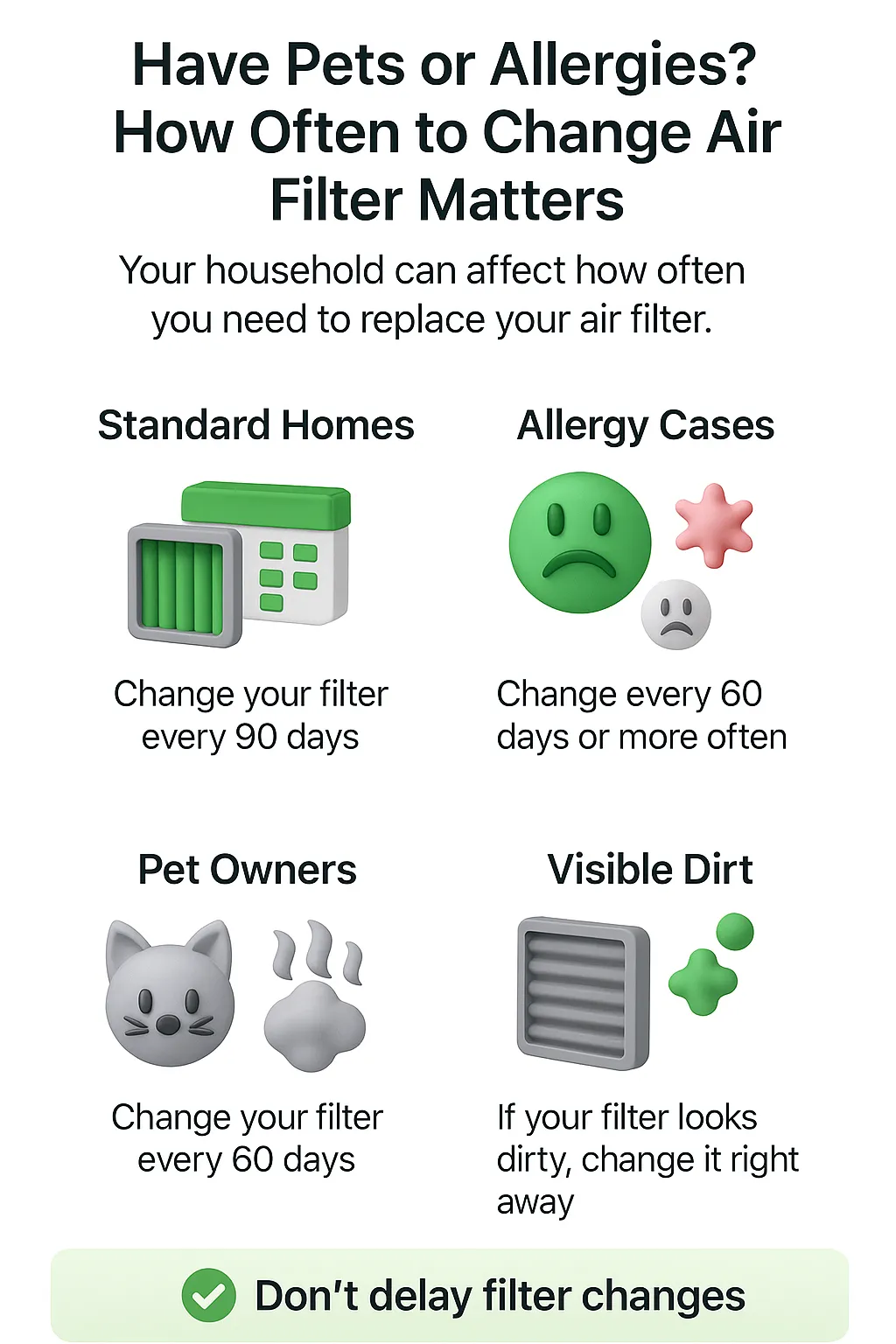Top Takeaways
Most people delay changes—causing poor air and rising energy costs.
If you have pets or allergies, change filters every 30–45 days.
Dirty filters can increase HVAC energy use by up to 20%.
Clean filters = fewer symptoms, lower bills, and longer system life.
Why Delaying Filter Changes Hits Harder With Pets or Allergies
If your home includes furry friends or allergy-sensitive family members, a clogged filter becomes a bigger problem—faster. Pet hair and dander quickly restrict airflow, while pollen and dust circulate longer in a home without proper filtration. This forces your HVAC system to work harder, driving up your energy usage and possibly shortening the life of your equipment.
Quick Reference Replacement Guide:
Pets or allergies: every 30–45 days
No pets, average use: every 90 days
Rarely used vacation homes: every 6–12 months
These recommendations are rooted in what HVAC pros observe on-site—not just printed timelines on filter packaging.
Expert Insight
“In homes with pets or allergy sufferers, waiting even 60 days can be too long. We’ve seen filters fully packed with dander in just one month—leading to dusty air and rising utility bills. A simple swap every few weeks can drastically improve comfort.”
Real-World Examples from the Field
Pet Household in Florida – $900 Mistake
Family of four with two dogs
Skipped filter changes for six months
HVAC broke during peak summer
Result: Burned blower motor and $900 in repairs
Cat Owner in L.A. – Allergy Symptoms Resolved
Renter with mild asthma
Changed to a MERV 8 filter, swapped every 45 days
Symptoms dramatically reduced within two weeks
What Technicians Report from 500+ Homes
Pet owners and smokers: change filters monthly
Allergy sufferers: every 30–45 days
Light-use homes: every 6–12 months
Supporting Research
Clogged filters raise energy use by up to 20%
(U.S. Department of Energy – energy.gov)
Routine filter changes lower energy bills by 5–15%
(energy.gov)
Indoor air pollutants originate inside homes
(EPA.gov)
CDC recommends routine filter swaps to limit airborne illness
(cdc.gov)
Final Thought
If your household includes pets or allergy-prone individuals, changing your air filter isn’t just a suggestion—it’s a must. We’ve seen how a $15 filter swap can prevent hundreds in repairs and weeks of discomfort. Your home’s air isn’t just circulating—it’s shaping your health and comfort. Be proactive. Match your filter schedule to your lifestyle. Breathe easier, live better.
What You Should Do Next
Inspect your filter: If it’s dark or dusty, replace it now.
Set a schedule:
Pets/allergies: every 30–45 days
No pets: every 90 days
Low-use home: every 6–12 months
Stock up: Keep extra filters on hand.
Install it yourself or schedule an HVAC checkup.
Track your changes: Use a calendar reminder or printable checklist.

Frequently Asked Questions
How often should I change my air filter if I have pets or allergies
For homes with pets or allergy sufferers, it's best to replace your air filter every 30 to 45 days. Pet dander and allergens build up quickly, clogging filters faster than in average homes.
What type of air filter is best for pet owners and allergy relief
Look for filters with a MERV rating between 11 and 13. These filters can trap smaller particles like pet dander, pollen, mold spores, and dust mites that commonly affect sensitive individuals.
Can a dirty air filter make my allergies worse
Yes. When a filter becomes clogged, it can no longer trap allergens effectively. As a result, dust, pet dander, and pollen are recirculated through your home, triggering allergy symptoms.
Do multiple pets require more frequent filter changes
Absolutely. The more pets you have, the more hair and dander is produced. In multi-pet households, changing the filter every 30 days or less is often necessary to maintain good air quality.
Is it worth using a higher-efficiency filter even if I clean regularly
Yes. Even with routine cleaning, allergens and airborne particles can still circulate. A high-efficiency filter complements your cleaning routine, offering added protection against allergy triggers.
When you have pets or suffer from allergies, maintaining healthy indoor air becomes a daily priority—and that starts with knowing how often to change your air filter. Pet dander and airborne allergens accumulate faster than you'd think, making timely filter changes essential. Choosing the right HVAC setup, such as those offered through HVAC System Installation in Cooper City, FL, ensures your system is built to handle extra filtration demands. Regular maintenance like professional vent cleaning from Dryer Vent Cleaning Service helps prevent dust buildup and keeps airflow optimal. And just like optimizing air quality at home, running a healthy business often requires outside perspective—What You Need to Know About Marketing Consulting offers insight into staying proactive and ahead of the curve. Together, these resources emphasize that whether it’s air or strategy, regular updates and clean starts make all the difference.






